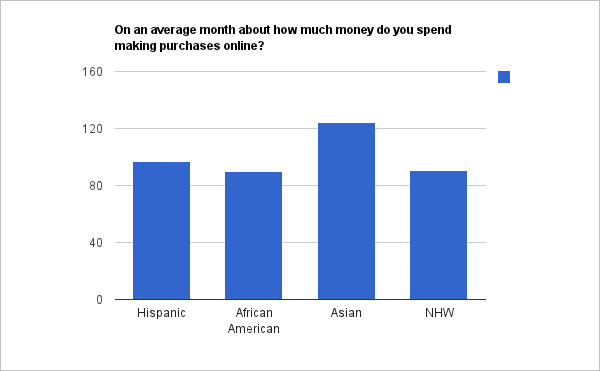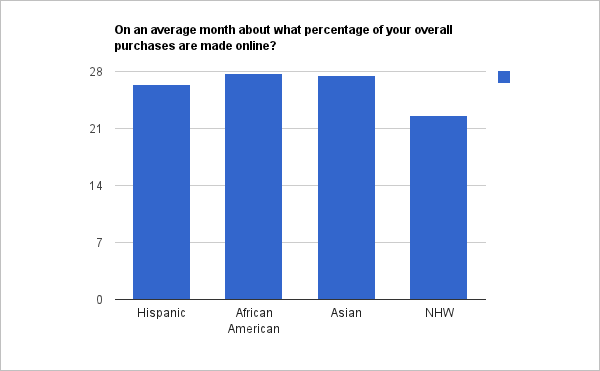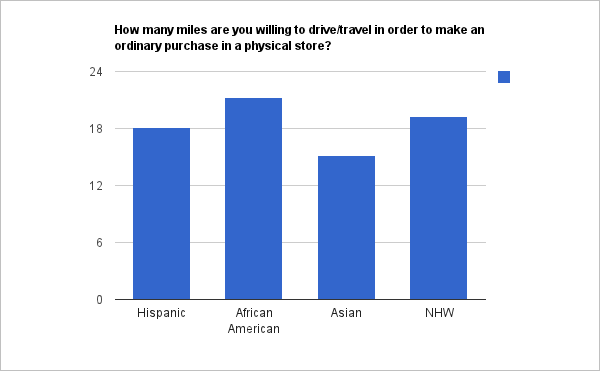How much money do members of different cultural groups spend online in an average month? What percentage of their purchases does that represent? These are two of the questions addressed with culturally diverse consumers in the 2012 multicultural marketing study of the Center for Hispanic Marketing Communication of Florida State University in cooperation with Research Now.
Monthly expenditures online differ in a somewhat predictable and interesting way as can be seen in the chart below.

Asians in the US indicate they spend about $125 dollars making purchases online and this mean is statistically different from that of all other groups. There was not a statistically significant difference among Non Hispanic Whites, African Americans and Hispanics. The affluence of US Asians and their proclivity for online shopping may account for this difference. Still the amount of money of the three other cultural groups is substantive as well.
Interestingly, the proportion of purchases reported did not differ statistically among most groups as seen in the chart below, except that non Hispanic Whites reported a somewhat lower proportion of monthly online purchases than the other three groups..

The overall trends are notable because many marketers have not realized that once online consumers of all groups tend to spend about the same amount on online purchases. Thus, online marketing should be directed to each of these groups emphasizing the unique cultural relevance of the product or service. Basically, once online there does not seem to be a dominant group to whom messages need to be directed. In the average, all these consumers are spending similar amounts. Notably, Asians tend to stand out as online shoppers because of their affluence, and non Hispanic Whites by being somewhat less eager to purchase online. This latter finding is counterintuitive because the expectation has generally been that non Hispanic Whites would be more likely to be active online. Things are changing as we can see.
We also asked respondents to tell us about how many miles they would be willing to drive to make an ordinary purchase at a physical store. Below are the results.

As we can see Asians are least willing to drive/travel to make purchases in a physical store, while African Americans indicate they are willing to drive the longest distances. Hispanics and non Hispanic Whites are statistically intermediate in terms of the distances they are willing to drive. As shopping online becomes more prevalent, the convenience of not having to drive long distances to make a purchase is becoming prevalent among all cultural groups and more pronouncedly for Asians.
Are those less willing to drive more likely to find the tax advantage still available online more appealing? I computed the correlations between the willingness to drive to make purchases and the data for the question “I purchase products online to save the money I would have to pay for State taxes.” The correlation was -.032 or basically “zero,” meaning that lack of willingness to drive and the motivation to save State tax money are unrelated. People seem to make their purchases online because of convenience, regardless of cultural group. On a six point scale from zero to 5, respondents in this study gave an overall 3.62 to the statement “I shop online for the convenience of it” and there were no statistical differences among the cultural groups.
The moral of the story being told by these data is that online shopping takes an important part in our multicultural society and that marketers need to pay attention by vesting cultural attention in their emerging online clientele.
The data for this study was collected by Research Now of Dallas, Texas, thanks to the generous initiative of Ms. Melanie Courtright. Research Now contributed these data to the research efforts of the Center for Hispanic Marketing Communication at Florida State University. This online survey included the responses of 936 Asians, 458 African Americans, 833 Hispanics, and 456 non Hispanic Whites. This national sample had quotas for US region, age, and gender to increase representativeness.
Many local merchants and multiple brick and mortar retailers complain that online merchants have an unfair advantage because many of them do not charge State and local taxes to purchasers. That is an interesting empirical question, particularly in the context of our multicultural society.
Are consumers more likely to buy online to save on taxes, or are they more attracted to online retailers because of convenience? That is the key question guiding this study.
In the Spring of 2012, at the Center for Hispanic Marketing Communication of Florida State University, in collaboration with Research Now, we collected data for our yearly Multicultural Marketing Study. We asked consumers to tell us how much they agree or disagree with the following statements:
- I purchase products online to save the money I would have to pay for State taxes
and
- If online merchants charged State tax I would continue purchasing online at the same rate I do now
Respondents could agree or disagree on a scale that went from completely disagree (0) to Completely agree (5).
Interestingly, across all respondents the average agreement with the first statement was 2.42 and 2.5 with the second statement, almost exactly in the middle of the scale. These overall trends appear to indicate that paying or not paying State taxes when shopping online is not a major consideration for shopping online. These findings tend to negate politicians’ and brick and mortar merchant arguments that advocate that local merchants would fare better if State taxes were imposed on online merchants.
The breakdown by major ethnic groups reveals some interesting but mild differences.

Statistically, Asians agreed the most with “I purchase products online to save the money I would have to pay for State taxes.” Hispanics were second and African Americans and Non-Hispanic Whites were least likely to agree with the statement. Still the differences are relatively small. Frugality may account for some of these differences. Still, even the largest mean of 2.8 for Asians is still relatively small in the context of the scale and seems to indicate that saving on State taxes is not a major motivation for purchasing online.
The distribution of means for the second statement shows a contrasting pattern:

Even though the differences here are again relatively small, the tendency for non Hispanic Whites to agree more strongly with the statement “If online merchants charged State tax I would continue purchasing online at the same rate I do now” indicates cultural differences in the perception of value and saving on taxes. There was not statistically significant difference among Asians, Hispanics, and African Americans.
In sum, Asians seem to be somewhat more motivated by tax savings when purchasing online, and non Hispanic Whites appear to be more indifferent to online purchase taxation. Still, the main finding is clearly that overall, the impact of State taxing of online purchases is not likely to make a major difference. Convenience appears to be a major motivation for making online purchases. The cost of fuel and the amount of time that it takes to shop in brick and mortar shops does not appear to compensate for State taxation. It is unfortunate that brick and mortar businesses may not count on State taxation of line purchases to strengthen their businesses to any large extent. Perhaps the biggest lesson for marketers is that regardless of online taxation brick and mortar merchants need to transition to having a presence online. Also, the results of this research do point to cultural differences in perceptions of online purchase taxation that can be of interest to marketers in their positioning of their offerings.
The data for this study was collected by Research Now of Dallas, Texas, thanks to the generous initiative of Ms. Melanie Courtright. Research Now contributed these data to the research efforts of the Center for Hispanic Marketing Communication at Florida State University. This online survey included the responses of 936 Asians, 458 African Americans, 833 Hispanics, and 456 non Hispanic Whites. This national sample had quotas for US region, age, and gender to increase representativeness.